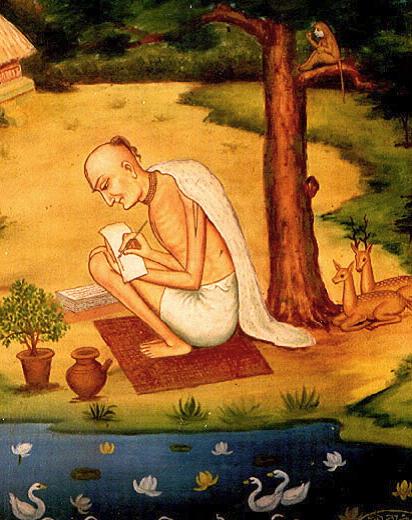The Holy Places of Vrndavan
by Krsnadasa Kaviraja Goswami
1)
jaya rādhe, jaya kṛṣṇa, jaya vṛndāvan
śrī govinda, gopīnātha, madana-mohan
jaya rādhe jaya kṛṣṇa–all glories to Srī Srī Rādhā and Kṛṣṇa; jaya vṛndāvana–glories to the transcendental realm of Vṛndāvana; śrīgovinda gopīnātha madana-mohana–glories to the three presiding Deities of Vṛndāvana : Govinda, Gopīnātha and Madana-mohana.
All glories to Radha and Krsna and the divine forest of Vrndavana. All glories to the three presiding Deities of Vrndavana–Sri Govinda, Gopinatha, and Madana-mohana.
2)
śyama-kunḍa, rādhā-kuṇḍa, giri-govardhan
kālindi jamunā jaya, jaya mahāvan
śyāma-kuṇḍa–glories to the personal lake of śyāma; rādhā-kuṇḍa–glories to the personal lake of Rādhā; giri-govardhan–glories to Govardhana Hill; kālindī yamunā jaya–glories to the Yamunā river, known as Kālindī, the daughter of the Kalinda mountain; jaya mahāvana–glories to the great forest of Mahāvana, the place of Kṛṣṇa’s childhood pastimes.
All glories to Syama-kunda, Radha-kunda, Govardhana Hill, and the Yamuna River (Kalindi). All glories to the great forest known as Mahavana, where Krsna and Balarama displayed all of Their childhood pastimes.
(3)
keśī-ghāṭa, baḿśi-baṭa, dwādaśa-kānan
jāhā saba līlā koilo śrī-nanda-nandan
keśī-ghāṭa–glories to Keśī-ghāṭa, where Kṛṣṇa killed the horse demon; vaḿśī-vaṭa–glories to the Vaḿśī-vaṭa tree, where Kṛṣṇa sits and calls the gopīs with His flute; dvādaśa-kānana–glories to the twelve forests of Vraja; yāhā–where; saba–all; līlā–pastimes; koilo–performed; śrī-nanda- nandana–the son of Nanda Mahārāja.
All glories to Kesi-ghata, where Krsna killed the Kesi demon. All glories to the Vamsi-vata tree, where Krsna attracted all the gopis to come by playing His flute. Glories to all of the twelve forests of Vraja. At these places the son of Nanda, Sri Krsna, performed all of His pastimes.
(4)
śrī-nanda-jaśodā jaya, jaya gopa-gaṇ
śrīdāmādi jaya, jaya dhenu-vatsa-gaṇ
śrī-nanda-yaśodā jaya–glories to Kṛṣṇa’s divine mother and father, Nanda and Yaśodā; jaya gopa-gaṇa–glories to the assembly of cowherd boys; śrīdāmādi jaya–glories to the cowherd boy leaders headed by Srīdāmā; jaya dhenu-vatsa-gaṇa–glories to the herds of cows and calves.
All glories to Krsna’s divine father and mother Nanda and Yasoda. All glories to the cowherd boys, headed by Sridama, the older brother of Srimati Radharani and Ananga Manjari. All glories to the cows and calves of Vraja.
(5)
jaya bṛṣabhānu, jaya kīrtidā sundarī
jaya paurṇamāsī, jaya ābhīra-nāgarī
jaya vṛṣabhānu–glories to Rādhā’s father; jaya kīrtidā-sundarī–glories to Rādhā’s beautiful mother; jaya paurṇamāsī–glories to the elderly Paurṇamāsī, the personality of Yogamāyā; jaya ābhīra-nāgarī–glories to the cowherd women of Vraja.
All glories to Radha’s divine father and mother, Vrsabhanu and the beautiful Kirtida. All glories to Paurnamasi, the mother of Sandipani Muni, grandmother of Madhumangala and Nandimukhi, and beloved disciple of Devarsi Narada. All glories lo the young cowherd maidens of Vraja.
(6)
jaya jaya gopīśwara vṛndāvana-mājh
jaya jaya kṛṣṇa-sakhā baṭu dwija-rāj
jaya jaya gopīśvara–glories to the presence of Lord Siva as Gopīśvara Mahādeva; vṛndāvana-mājha–in the midst of Vṛndāvana; jaya jaya kṛṣṇa-sakhā–glories, all glories to the cowherd boyfriend of Kṛṣṇa; baṭu– Srī Madhumańgala; dvija-rāja–the monarch of the twice-born brāhmaṇas.
All glories, all glories to Gopisvara Siva, who resides in Vrndavana in order to protect the holy dhama. All glories, all glories to Krsna’s funny Brahmana friend, Madhumangala.
(7)
jaya rāma-ghāta, jaya rohiṇī-nandan
jaya jaya vṛndāvana-bāsī jata jan
jaya rāma-ghāṭa–glories to the landing on the Yamunā river where Balarāma sported the rāsa—dance; jaya rohiṇī-nandana–glories to the son of Rohiṇī (Balarāma); jaya jaya vṛndāvana-vāsī–glories, all glories to the inhabitants of Vṛndāvana; yata–all; jana–the people.
All glories to Rama-ghata, where Lord Balarama performed His rasa dance. All glories to Lord Balarama, the son of Rohini. All glories, all glories to all of the residents of Vrndavana.
(8)
jaya dwija-patnī, jaya nāga-kanyā-gaṇ
bhaktite jāhārā pāilo govinda-caraṇ
jaya dvija-patnī–glories to the wives of the Vedic brāhmaṇas; jaya nāgakanyā-gaṇa–glories to the wives of the Kāliya serpent; bhaktite–in devotion; yāhārā–of whom; pāilo–had attained; govinda-caraṇa–the lotus feet of Govinda.
All glories to the wives of the proud Vedic brahmanas. All glories to the wives of the Kaliya serpent. Through pure devotion they all obtained the lotus feet of Lord Govinda.
(9)
śrī-rasa-maṇḍala jaya, jaya rādhā-śyām
jaya jaya rasa-līlā sarva-manoram
śrī-rāsa-maṇḍala jaya–glories to the circular arena of the rāsa—dance; jaya rādhā-śyāma–glories to Rādhā-śyāma; jaya rāsa-līlā–glories to the rāsa-līlā; sarva-manorama–which captures the minds of all.
All glories to the place where the rasa dance of Sri Krsna was performed. All glories to Radha and Syama. All glories, all glories to the divine rasa dance, which is the most beautiful of all Lord Krsna’s pastimes.
(10)
jaya jayojjwala-rasa sarva-rasa-sār
parakīyā-bhāve jāhā brajete pracār
jaya jayojjvala-rasa–glories to the ujjvala-rasa, the conjugal mellow; sarva-rasa-sāra–the quintessence of all ecstatic mellows; parakīyā- bhāve–in the mood of paramourship; yāhā–which; brajete pracāra–is manifest only in the realm of Vraja.
All glories, all glories to the mellow of conjugal love, which is the most excellent of all rasas and is propagated in Vraja by Sri Krsna in the form of the divine parakiya-bhava [paramour love].
(11)
śrī-jāhnavā-pāda-padma koriyā smaraṇ
dīna kṛṣṇa-dāsa kohe nāma-sańkīrtan
śrī-jāhnavā-pāda-padma–the lotus feet of Lord Nityānanda’s śakti, Srī Jāhnavā-devī koriyā smaraṇa–remembering; dīna kṛṣṇadāsa–Dīna Duhkhi Kṛṣṇadāsa; kohe nāma-sańkīrtana–sings the names of the Lord
Remembering the lotus feet of Lord Nityananda’s consort Sri Jahnava Devi, this very fallen and lowly servant of Krsna sings the sankirtana of the holy name.
